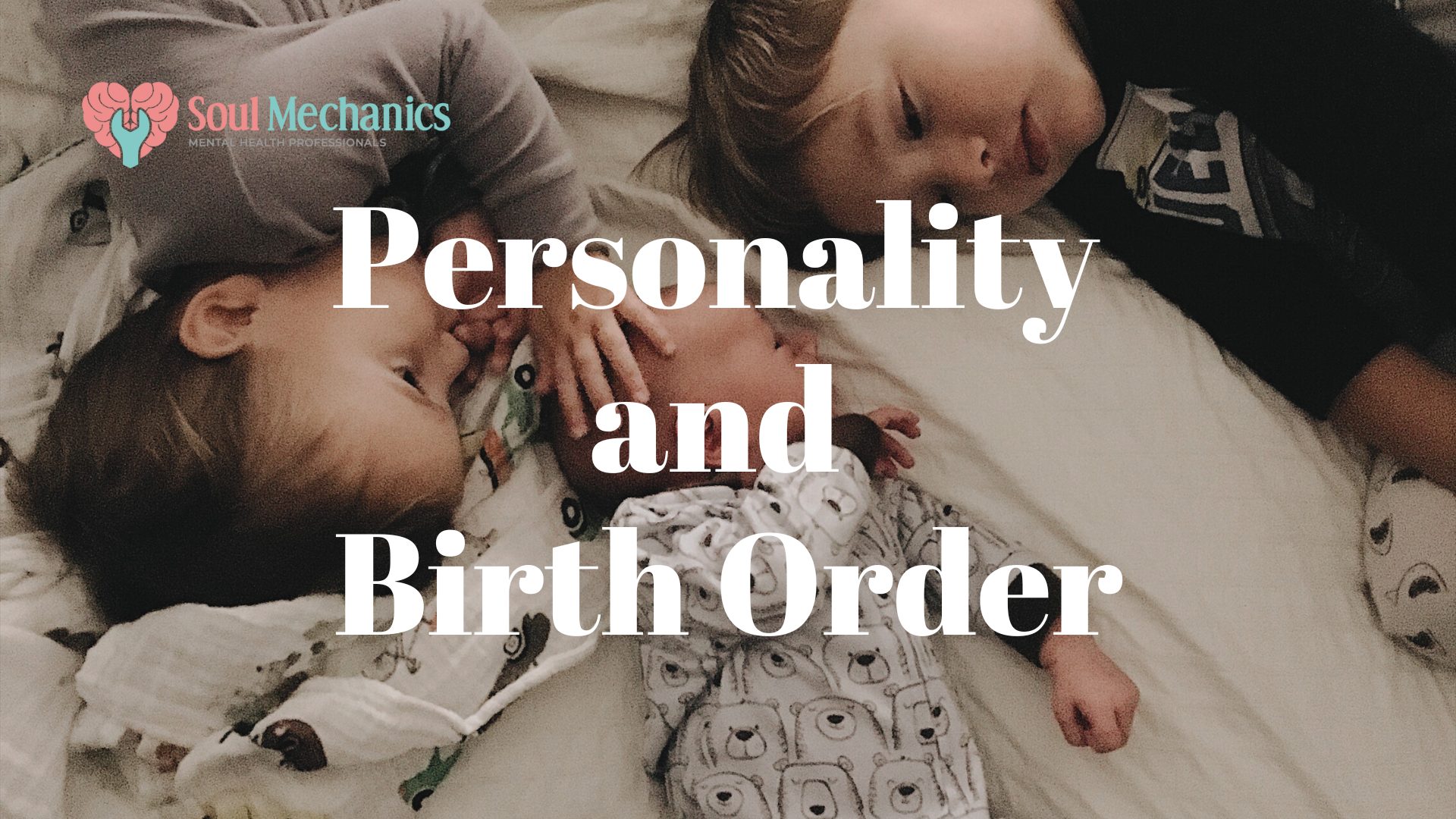Personality & Birth Order
Personality & Birth Order

Written By: Kelly Chan Jia Li, Clinical Psychologist (MAHPC(CP)00353)

Have you ever wondered why siblings in the same family can be so different from each other? Maybe your older sibling is the responsible one, always taking charge, while you, the youngest, tend to be more carefree and outgoing. Or perhaps you have seen how your middle sibling is the peacemaker, always trying to keep the peace between you and your older sibling’s constant squabbles. Believe it or not, there is an interesting theory that explains these differences: birth order. Let’s understand how birth order may shape personalities.
Reminder: If you or your loved ones are struggling with mental health conditions, please don't hesitate to reach out to us at Soul Mechanics KD or Soul Mechanics Ipoh. Remember, seeking help is not a sign of weakness but strength!
First, Let’s Learn More About Personality!
Personality is the unique set of characteristics, traits, and behaviours that distinguish you from others. It encompasses your thoughts, emotions, and patterns of behaviour that shape your interactions with the world. Several major theories attempt to explain how your personality develops. For example, psychoanalytic theory emphasizes the role of unconscious processes and early childhood experiences in shaping personality. Trait theory focuses on identifying and categorizing specific personality traits that individuals possess. On the other hand, social-cognitive theory suggests that personality is shaped through interactions between an individual’s cognitive processes, behaviour, and the social environment. Hence, by considering these different theories, we can better understand how birth order theory fits into the broader dimension of personality development.
Birth order theory is a psychological concept that suggests that the order in which you are born into a family can significantly shape your personality and development. This theory proposes that each birth position, whether you are the oldest, middle, youngest, or only child, influences certain traits and behaviours in individuals. Additionally, birth order theory also explores how siblings’ relationships and interactions can shape their overall development and social skills. While it is not an exact science and does not apply to everyone, birth order theory may offer fascinating insights into why we are the way we are.
The Firstborn: The Responsible Leader
Imagine being the first child in your family, the one who paved the way for your siblings.
You are typically natural leaders, responsible, and ambitious.
Growing up as the eldest, you may have experienced undivided attention from your parents before your siblings came along.
You were the one they turned to first in your family, whereby this early spotlight can foster a sense of confidence and independence.

As the firstborn, you likely took on a lot of responsibility early on. You may have felt the pressure to set a good example for your younger siblings, always striving to excel in school and life. Your parents may have had high expectations for you, pushing you to succeed and achieve your goals. This can lead you to be more conscientious and achievement-oriented. These traits can serve you well in academic and professional pursuits, as you are often diligent and driven to succeed.
The research found that firstborn children were more likely to hold leadership positions in their schools and extracurricular activities compared to their younger siblings. At the same time, it also found that firstborn children were more likely to take charge in group projects and demonstrate assertiveness in decision-making situations. Firstborn children tend to exhibit more leadership qualities and a greater sense of responsibility, as they often take on the role of the ‘oldest’ and may receive more attention and expectations from parents.
But being the firstborn is not always easy. You may sometimes feel like you missed out on the freedom and attention your younger siblings received. You also felt the pressure to live up to your parents’ standards, which could sometimes be overwhelming.
Reminder: If you or your loved ones are struggling with mental health conditions, please don't hesitate to reach out to us at Soul Mechanics KD or Soul Mechanics Ipoh. Remember, seeking help is not a sign of weakness but strength!
The Middle Child: The Peacemaker
Now, picture yourself as the middle child stuck between an older sibling who always seems to get their way and a younger sibling who demands attention.

You are like the glue that holds your family together, the one who is always trying to keep the peace.
As the middle child, you may not receive the same level of attention or expectations as the firstborn, nor do you have the privilege of being the youngest.
Instead, you have learned to be adaptable and diplomatic. Growing up sandwiched between siblings, you learn the art of compromise and conflict resolution early on. You are the one who is constantly mediating conflicts between your siblings, trying to find common ground and smooth things over. You tend to be more laid-back and friendly, adept at maintaining harmony within the family.
This ability to see different perspectives and mediate disputes can translate into valuable interpersonal skills later in life. For example, in personal relationships, your ability to mediate conflicts and find common ground can create harmony and strengthen bonds between family members, friends, and partners. These skills can be invaluable in managing team dynamics, resolving conflicts, and fostering collaboration in professional settings. Additionally, you develop a sense of independence and self-reliance due to your position in the family. This independence and self-reliance can lead to increased self-confidence and adaptability.
However, being the middle child can also come with its challenges. You may sometimes feel overlooked or overshadowed by your siblings, leading to a desire for validation and recognition. This can manifest in various ways, from seeking attention through achievement to rebelling against perceived injustices.
Reminder: If you or your loved ones are struggling with mental health conditions, please don't hesitate to reach out to us at Soul Mechanics KD or Soul Mechanics Ipoh. Remember, seeking help is not a sign of weakness but strength!
The Youngest Child: The Baby of the Family
Now, think about what it is like to be the baby of the family, the one who gets away with everything.
You are used to being doted on by your parents and looked up to by your older siblings.
You benefit from the wisdom and guidance of your older siblings. Plus receiving a more relaxed and lenient parenting style from your parents.
You may receive more attention from your parents and siblings, contributing to your outgoing and attention-seeking behaviour.

As the youngest child, you have grown up in a household where your older siblings have already paved the way for you. Because you are used to having older siblings to look up to, you may feel less pressure to conform to expectations and more freedom to explore your interests and identities. You may have more opportunities to engage in creative play and develop your imagination. This can lead to a strong sense of individuality and a willingness to take risks. Growing up in the shadow of your older siblings, you also learn to be resourceful and adaptable, developing a sense of resilience and independence.
However, being the youngest is not without its drawbacks. You may sometimes struggle with feelings of inferiority, inadequacy or insecurity, particularly if your older siblings achieve more academically or socially. The challenges of being the youngest child can have long-term effects on their self-esteem and self-confidence. Suppose you constantly feel overshadowed by your older siblings. In that case, you may develop a sense of inadequacy that can persist into adulthood, affecting your relationships and overall well-being.
The Only Child: The Independent Achiever
Finally, let’s consider what it is like to grow up as an only child, with all the attention and expectations focused solely on you.

You are showered with love and affection from your parents, who doted on you endlessly.
You are like a miniature adult. Additionally, used to having the spotlight all to yourself.
You learn to be independent and self-reliant, with a strong sense of who you are and what you want from life.
Being the only child often exhibits a blend of traits from firstborns and youngest children. Like firstborns, you receive undivided attention and may develop strong leadership skills. However, you also share similarities with the youngest children, enjoying a sense of freedom and independence. As an only child, you do not have to compete with siblings for your parents’ attention as you have their undivided focus from day one. You are also free to pursue your interests and passions without any distractions.
On the flip side, you may feel a heightened pressure to succeed while growing up as the sole focus of your parent’s attention. You may sometimes feel lonely or isolated, especially if you do not have many friends or social outlets. You may also find it challenging to share and compromise, having grown accustomed to having things your way.
Soul Mechanic’s Takeaway
To conclude, birth order plays a significant role in shaping your personality and behaviour. Whether you are the responsible firstborn, the diplomatic middle child, the charismatic youngest child, or the independent only child, your place in the family has helped shape who you are today. While birth order theory offers valuable insights into personality development, it is essential to recognize that individual differences (e.g., genetics and life experiences) also significantly shape who we are.

If you’re looking for a therapist in Kota Damansara or Ipoh area, you can click here for more information.
If you enjoyed reading this, why not broaden the horizon of knowledge by learning about "DOPE Personality Test: Understanding Your Bird Personality"?
You can read the blog here.
For more content related to mental health do follow us on our official Instagram.


